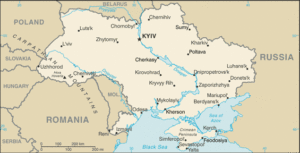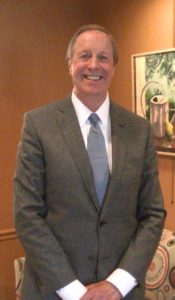This week on The Score – What happens when candidates for Commonwealth’s Attorney face off? Why does Ukraine loom so large in foreign affairs? Can we ever be satisfied by the Electoral College?
http://bearingdrift.com/wp-content/uploads/TheScore_Oct12_FullHour.mp3 [1]This was a big week in politics, no matter what your perspective. Two candidates for Commonwealth’s Attorney in Albemarle County debated each other, and we chatted with each of them afterwards. Stay tuned for the second half of The Score to hear what they have to say about the law and about each other.
Ukraine Scrutinized
First, let’s look at a name that’s in the headlines this week and looks to stay there for a long time to come: Ukraine, the eastern European country that may determine the future of who lives in the White House.
 A few months ago [2], we spoke with John Dale Grover, assistant managing editor of The National Interest [3], in anticipation of Ukraine’s presidential election. He’s back with us this week to talk about how Ukraine fits into the international political and economic order. I spoke with him by telephone on Thursday from his office in Washington.
A few months ago [2], we spoke with John Dale Grover, assistant managing editor of The National Interest [3], in anticipation of Ukraine’s presidential election. He’s back with us this week to talk about how Ukraine fits into the international political and economic order. I spoke with him by telephone on Thursday from his office in Washington.
John’s articles, “Admitting Ukraine into NATO is a fool’s errand [4]” and “Crimea – the cost of sanctions and the risk of retaliation [5],” appeared in the Kyiv Post. He wrote “Trump will Leave Ukraine Out in the Cold [6]” for BlogActiv in November 2016.
You can follow @JohnDaleGrover [7] on Twitter.
Electoral College

Another issue that people like to talk about these days is the Electoral College. Is it a flawed system for electing the president? Professor Mark Rush [9] of Washington and Lee University has thought about this. I called him on Thursday afternoon to learn more about the Electoral College — its structure, its history, its idiosyncracies. He was in his faculty office in Lexington, where he is Stanley G. and Nikki Waxberg Professor of Politics and Law as well as director of the university’s Center for International Education.
Rush offers an international perspective on the challenges posed by the Electoral College and notes that perceived flaws are not unique to the U.S. system. In a recent article for The Conversation [10] (which I saw in The Daily Progress), Rush wrote:
Other federal nations endure the same disparity of representation that favors smaller states.
Canada has a similar disparity of voting power between the larger provinces of Ontario and Quebec – which each has more than 100,000 people per member of Parliament – and smaller ones such as Nunavut or the Yukon, with barely 35,000 people per member of Parliament. Albertans have the least voting power per capita, with nearly 120,000 residents per member of Parliament.
In Spain, too, power is unevenly allocated. With nearly 180,000 people per representative in the Congress, people in Madrid and Barcelona have much less voting power per capita than the denizens of less-populated provinces such as Soria.
This demonstrates the complexity of organizing a democracy that ensures equality of individual voting power, but also allows smaller states or provinces to have a meaningful voice in the legislative process and the election of presidents.
Rush is co-author (with Christopher Manfredi) of Judging Democracy [11] (2008) and (with Richard L. Engstrom and Bruce E. Cain) of Fair and Effective Representation? Debating Electoral Reform and Minority Rights [12] (2001). You can find him on Twitter as @Mark_Rush [13].
Last March, I interviewed the Cato Institute’s John Samples [14] about the Electoral College for The Score, and I wrote about it [15] just before the 2016 presidential election in the Richmond Times-Dispatch.
Dueling Prosecutors
 This past Wednesday in Charlottesville, the Senior Statesmen of Virginia hosted a candidates’ forum. The first half featured two candidates for Commonwealth’s Attorney in Albemarle County, where incumbent Republican Robert Tracci faces a challenge from criminal defense lawyer Jim Hingeley, the Democratic party’s nominee. I spoke to them both after the debate.
This past Wednesday in Charlottesville, the Senior Statesmen of Virginia hosted a candidates’ forum. The first half featured two candidates for Commonwealth’s Attorney in Albemarle County, where incumbent Republican Robert Tracci faces a challenge from criminal defense lawyer Jim Hingeley, the Democratic party’s nominee. I spoke to them both after the debate.
I asked each of them to assess their performances on the forum stage that day, and to explain the role of the Commonwealth’s Attorney to potential new voters. I also wanted to know whether there is a “Republican way and Democratic way” to do the prosecutor’s job.
 Tracci submitted to my questions first, immediately after the Commonwealth’s Attorney candidates’ debate. Hingeley followed about an hour later, after the state senate candidates’ debate had ended.
Tracci submitted to my questions first, immediately after the Commonwealth’s Attorney candidates’ debate. Hingeley followed about an hour later, after the state senate candidates’ debate had ended.
An earlier debate between Tracci and Hingeley was characterized as “contentious” by The Daily Progress, in which Tyler Hammel wrote [16]:
Though the debate was moderated, it didn’t take long for the candidates to deviate from the questions and attack each other’s qualifications.
Tracci, a former special assistant U.S. attorney, was elected in 2015, ousting Democrat Denise Lunsford, who had held the position since 2007. Hingeley criticized Tracci’s lack of experience, to which he attributed a number of “rookie mistakes.”
Hingeley cited Tracci’s biggest mistake as his failure to establish venue in a perjury trial against primary Unite the Right organizer Jason Kessler….
Changing gears, Tracci said he did not view the office of commonwealth’s attorney as political and claimed he was not a conservative or Republican prosecutor. Prosecutors are charged with upholding the law, not legislating, Tracci said.
“That is important and it takes discipline, because sometimes people want to subvert the law by ignoring the law,” he said. “Commonwealth’s attorneys cannot ignore it; there must be independence in this office.”
Hingeley rebuffed Tracci’s claim that he was unfit for the position because he had never prosecuted a case. As a founder of the Charlottesville-Albemarle Public Defender’s Office and its director for 18 years, Hingeley said he has ample experience with the criminal justice system and was intimately familiar with what is required of a prosecutor.
“I’m proud of my work with the Public Defender’s Office, helping to balance our criminal justice system, to make it equal so that there wasn’t an advantage on the defense side or on the prosecution’s side; to be fair and equal on the administration of justice,” he said.
Robert Tracci is on Twitter as @RobertTracci [17]. Jim Hingeley’s Twitter handle is @HingeleyJim [18].
Senate District 17
The Senior Statesmen of Virginia also hosted a discussion featuring three candidates for the Virginia State Senate. Two are looking to represent the 25th District, incumbent Democrat Creigh Deeds [19] and independent challenger Elliott Harding [20]. Both of them have been recent guests on The Score.
 The other candidate was Amy Laufer, a former Charlottesville school board member who is challenging incumbent Republican Bryce Reeves in the 17th state senate district. Reeves was invited to participate in the forum but declined the invitation — which he has reportedly done for all the forums held in the sprawling district, which stretches from Fredericksburg and Spotsylvania County to Culpeper County through Orange and parts of Albemarle counties.
The other candidate was Amy Laufer, a former Charlottesville school board member who is challenging incumbent Republican Bryce Reeves in the 17th state senate district. Reeves was invited to participate in the forum but declined the invitation — which he has reportedly done for all the forums held in the sprawling district, which stretches from Fredericksburg and Spotsylvania County to Culpeper County through Orange and parts of Albemarle counties.
I spoke briefly with Laufer after the debate. This is her second appearance [19] on The Score. Bryce Reeves was a guest on The Score [21] in May 2018.
Laufer is on Twitter as @Laufer4VA [22]. The discussion featuring Laufer, Deeds, and Harding is available to see on YouTube [23]; it was moderated by Anita Shelburne, editorial page editor of The Daily Progress.
From the Archives
This week’s interview “from the archives” features Jason Grumet, president of the Bipartisan Policy Center in Washington. I spoke to him at the 2014 Virginia Festival of the Book in Charlottesville. His topic was civility and cooperation in politics, which he addresses in his book, City of Rivals: Restoring the Glorious Mess of American Democracy [24].
One question I asked him was about a suggestion, made a few days before by President Barack Obama, regarding mandatory voting [25].
“There’s a constitutional issue,” he said.
Compulsory voting, he explained, is “more of an aspiration than a practical solution. Like everything, there are pros and cons.”
Grumet conceded that “it would be terrific to have greater participation in a participatory democracy” but he pointed to problems in the country identified by President Obama as a potential model.
In Australia, he said, experience has shown that “the downside is a lot of people are essentially forced to vote who have no desire to participate in the process, no information about the process, and so there’s a question about whether you dilute the quality of the voter pool.”
There are good and bad levels of participation, he continued.
“Having 20 percent participate [or] having 100 percent participate probably also has some problems,” he said. On the other hand, “60 to 70 percent would be great.”
You can find Jason Grumet on Twitter as (naturally) @JasonGrumet [26]. You can also watch his Virginia Festival of the Book presentation (with Andrew Burstein) on YouTube [27].
Be sure to come back next week to hear more news, reviews, and interviews. The Score is always a work-in-progress, so comments and suggestions for potential topics or guests are always welcome.